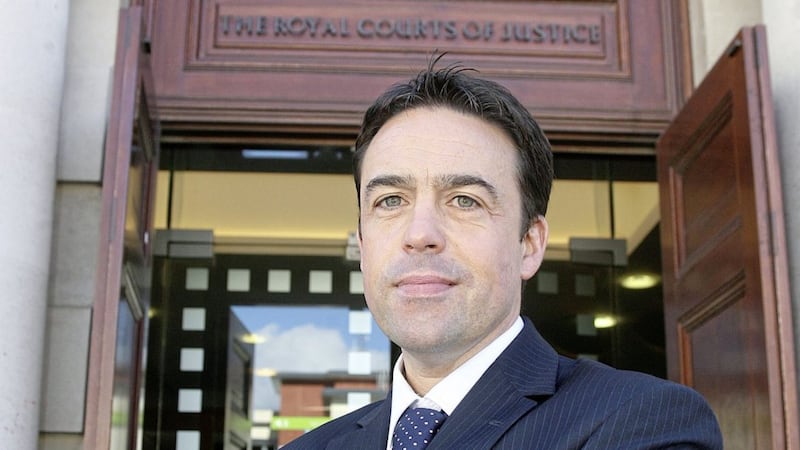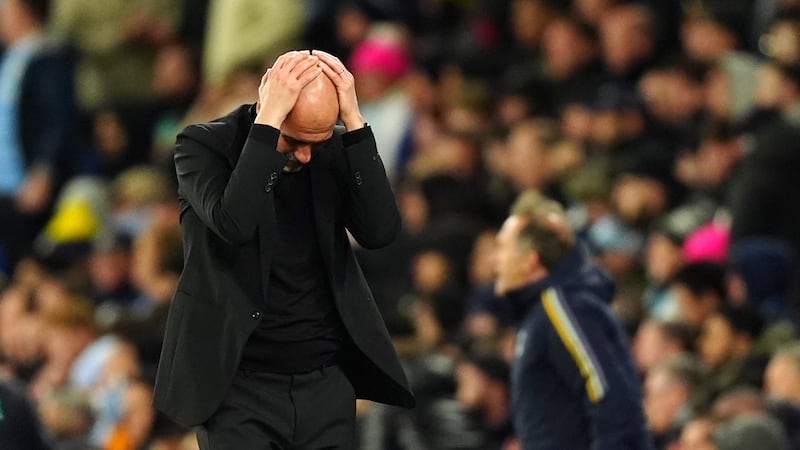WHEN the history is written on how the blanket ban on grassroots sports was lifted and which ended the open prison of thousands of children across the north, people should remember the passion and ceaseless energy of Stephen Atherton.
The father-of-five Glasgow-born solicitor, living in Magherafelt, has rattled Stormont cages – not only on his son’s behalf but every other child or young person who has been denied the chance to play sport.
Atherton has mounted a legal challenge against the Executive’s continued ban on children playing outdoor sports due to Covid restrictions.
There has been plenty of noise surrounding the suspension of grassroots sport, mostly from the sidelines – but Atherton has elevated the issue by articulating the devastation felt by so many children and indeed parents and guardians.
Alongside his legal challenge, he has launched a petition ‘Northern Ireland Executive: Let The Kids Play’, resigned from his vice-chairmanship of the IFA’s disciplinary committee, gained traction for his emotive campaign in the media and called for Koulla Yiasouma, Northern Ireland Commissioner for Children and Young People, to resign.
In his resignation letter to the IFA on Wednesday, he wrote: “I have made strenuous efforts to receive the support of the IFA, and implored that they issue a strong statement in support of children playing our national sport… I have not received such support.
“It is apparent to me, having conducted widespread research into the Executive’s decision-making, and the IFA’s response to same, that the IFA has failed absolutely, from March of this year onwards, to protect and advance the rights of children registered to the association.”
The IFA said it is bound by government restrictions and "strenuousy rejected" the solicitor's claims relating to the welfare of children.
In another address via the press, Atherton called for Koulla Yiasouma to step down from her role for, as he interprets it, the Commissioner’s “statutory failure” to observe its own guiding principle “to safeguard and promote the rights and best interests of children and young persons”.
In October, the Stormont Executive published a 24-page document explaining the impact of the ‘R’ rate from various sectors but there was no reference to the impact children’s outdoor sports was having on the soaring transmission of the virus – and yet it is children’s sports that have felt the full weight of the restrictions.
There is now a plethora of compelling data that consistently states children playing in the great outdoors has negligible impact on the rate of transmission – a point that was successfully rammed home by ex-footballer Robbie Savage who coaches at grassroots level in England.
As it transpired, Savage’s campaign – based on data and his ceaseless efforts – won the day. Kids in England can now return to grassroots games in early December.
Here, the lockdown rules are painted with obtusely broad, erratic brushstrokes.
The Northern Ireland Commissioner for Children and Young People has ably fought to keep schools open, citing low transmission rates among children, and also kept child poverty in sharp focus.
Responding to an Irish News enquiry over the Executive’s prohibition of children playing outdoor sports, Koulla Yiasouma said: “The specific restrictions on children playing outdoor sports are regrettable as physical exercise is vital for our children’s mental health and wellbeing, however these restrictions stop contact and movement of adults and young people and therefore reduce the likelihood of transmission.”
She continued: “I believe these short-term restrictions will ensure that children can enjoy their rights to sports, leisure, arts, culture and play to a fuller extent in the longer term.
“This position was not arrived at lightly but these are extraordinary times and these difficult choices have to be made.
“I will continue to monitor the situation.”
Only the restrictions at grassroots level are not short-term. They have been ongoing.
Children and young people have missed out on a huge chunk of playing outdoor sports from the first, more severe, lockdown while thousands of children in different codes were forced to suspend activity from mid-October.
It is irrefutable that grassroots sports for children is a safer environment than ‘elite’ sports that continue to function – and rightly so - because the kids invariably arrive for games and training sessions individually and are outdoors the entire time.
More trust should be afforded to youth football clubs, many of whom have clamped down on parental movement at games and training sessions.
Yesterday, back in the manic world of retail, the High Street shops were bursting at the seams with people frantically buying before the new restrictions kicked in.
An 'R' rate spike waiting to happen.
Every sector has fought its corner with the volume turned up, clambering for space on the airwaves.
The Irish Football Association hasn’t organised any of its hugely successful grassroots programmes since March and no return date has been mooted at this point, though a number of their coaches have been able to work in schools on a non-contact basis.
Like all organisations and businesses, football’s governing body has relied heavily on the government’s furlough scheme and therefore it is difficult to restart programmes without a reliable cash flow.
As a consequence, windows of opportunity between March to the present day have come and gone – and children remain locked out of the sport they love not knowing when they’ll be back.
Unlike other sectors, sport’s governing bodies have been relatively quiet on when they can get back to doing what they do best, but yesterday we were assured by one IFA official that discussions with the Executive were on-going.
The schizophrenic rules that govern these lockdowns – illustrated with comic effect by the relaxation of some restrictions over the Christmas period - need to be challenged with more vigour as the behind-the-scenes lobbying by sport’s stakeholders have yielded very little to date.
I caught up with a coach who looks after a local disability team to see how the club’s players were coping without football.
He told me they’ve had a number of mental health issues while one player had been placed on suicide watch.
It’s time the Executive threw the ball back in and outdoor sports stopped paying for somebody else's sins.
And when that day inevitably arrives and the Executive sees sense - hopefully sooner rather than later - we should acknowledge the efforts of Stephen Atherton for turning up the volume - because he turned it up on behalf of every child and young person who is struggling without the thing they love most of all in their affected lives.







